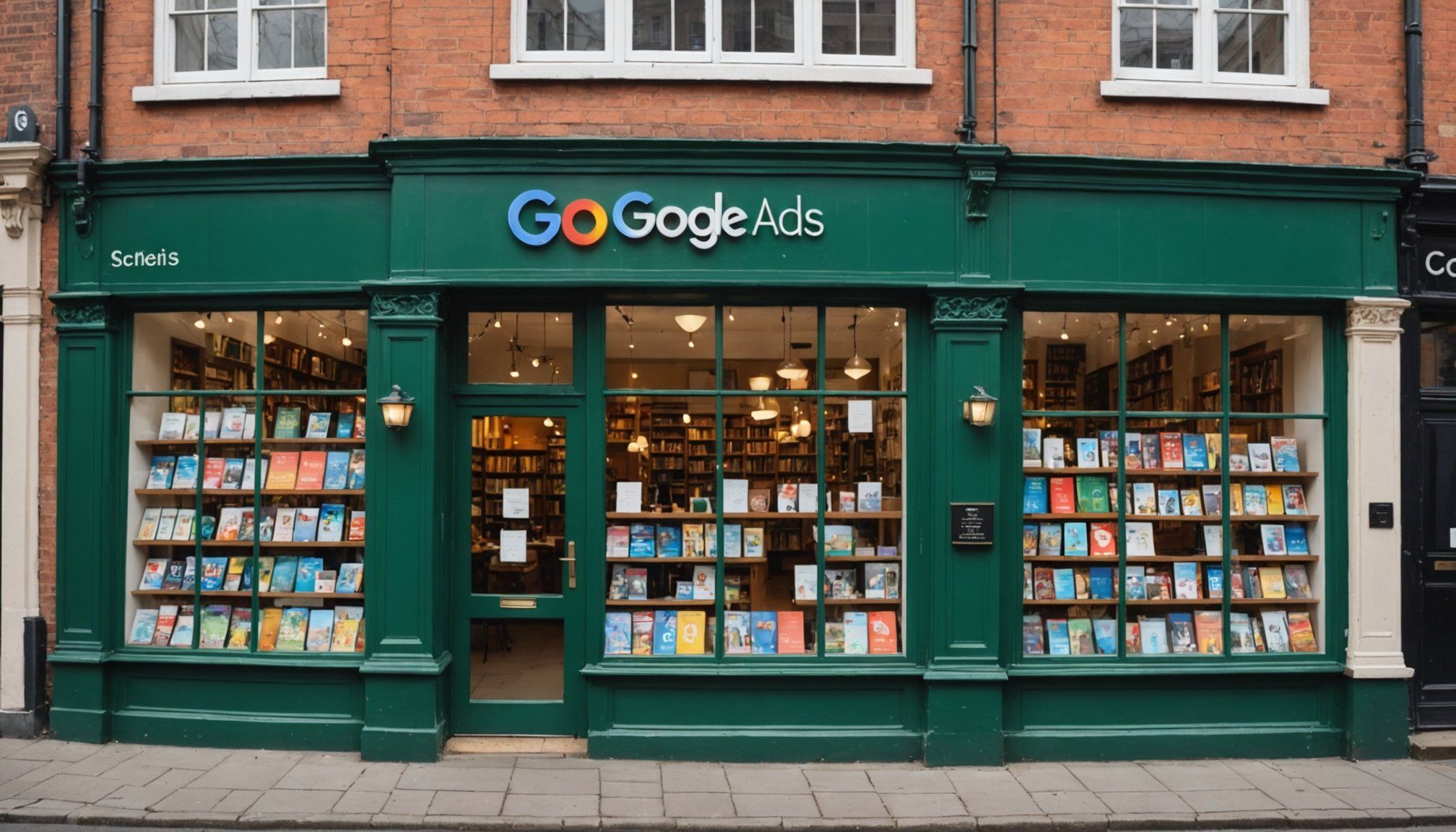Unlocking Google Ads: Proven Local Marketing Tactics for Independent UK Bookstores
In the competitive world of independent bookstores, leveraging local marketing strategies is crucial for attracting and retaining customers. Google Ads, with its powerful targeting capabilities, is an indispensable tool in this endeavor. Here’s a comprehensive guide on how to use Google Ads to boost your local marketing efforts and drive more customers to your UK bookstore.
Understanding Local Search Marketing
Local search marketing is the process of optimizing your online presence to appear prominently in local search results. This is particularly important for location-based businesses like bookstores, where foot traffic and local customer engagement are vital.
Also read : Boost Your Bakery’s Success: Proven Email Marketing Tactics for Launching Exclusive UK Pastries
For instance, when a customer searches for “bookstores near me” on Google, the search results include a mix of paid search ads, the local pack, and regular organic results. To appear in these results, you need to implement a robust local search marketing strategy.
-
Google Business Profile: Ensure your Google Business Profile is optimized with accurate and up-to-date information, including your address, hours of operation, and contact details. Positive reviews also play a significant role in improving your local search rankings[1].
Additional reading : Mastering LinkedIn: Proven Tactics for Boosting UK Software Startup Launches
-
Localized Content: Create content that is relevant to your local audience. This could include blog posts about local authors, book clubs, or literary events in your area. Such content signals to Google that your site is highly relevant to the local community[1].
Building a Strong Google Ads Campaign
To effectively use Google Ads for your local marketing, you need to understand how to set up and manage your campaigns.
Setting Up Location-Specific Ads
Google Ads allows you to target searchers in specific geographic locations, which is ideal for independent bookstores.
-
Local Search Ads: These are regular pay-per-click (PPC) ads that you can set to trigger only when users within specific locations search for your target keywords. For example, if you run a bookstore in London, you can target users searching for “bookstores in London”[1].
-
Google Local Services Ads: These ads are particularly useful for service-based businesses but can also be relevant for bookstores offering services like bookbinding or author events. They appear at the top of the search engine results page (SERP) and allow customers to contact you directly from the ad[1].
Tips for Running Effective Local Search Ads
Here are some tips to help you get the most out of your local search ads:
-
Geographic Targeting: Use Google Ads’ location targeting feature to ensure your ads are seen by people in your immediate area. This can be as specific as targeting users within a certain radius of your store[1].
-
Ad Extensions: Use ad extensions to provide additional information such as your store’s address, phone number, and business hours. This makes it easier for customers to find and contact you[4].
-
Smart Bidding: Utilize smart bidding strategies in Google Ads Editor to optimize your bids based on the likelihood of a conversion. This can help you maximize your return on ad spend (ROAS)[4].
Engaging with Your Local Community
Engaging with your local community is crucial for building a loyal customer base.
Encouraging Google Reviews
Google reviews are a powerful tool for local businesses. Here are some ways to encourage your customers to leave reviews:
- Ask Satisfied Customers: Provide satisfied customers with a QR code or a link to your Google review page.
- Offer Incentives: Offer discounts or coupons for customers who leave reviews.
- Respond to Reviews: Always respond to both positive and negative reviews to show that you value customer feedback[1].
Creating Localized Content
Localized content helps you connect with your local audience and improves your search rankings.
- Neighborhood Guides: Create content that is useful for locals, such as guides to local literary landmarks or recommendations for nearby cafes.
- Local Event Summaries: Write about local events, book festivals, or author readings.
- User-Generated Content: Encourage customers to share their experiences and feature this content on your website[1].
Leveraging Social Media and Email Marketing
While Google Ads is a powerful tool, it should be part of a broader digital marketing strategy that includes social media and email marketing.
Social Media Marketing
Social media platforms like Facebook, Instagram, and LinkedIn can help you reach a wider audience.
-
Identify Your Audience: Determine which platforms your target audience is most active on. For example, if your bookstore caters to a younger audience, Instagram might be a better choice than LinkedIn[2].
-
Content Strategy: Create content that resonates with your audience. This could include book reviews, author interviews, or behind-the-scenes looks at your store.
Email Marketing
Email marketing is an effective way to keep your customers engaged and informed about your store.
- Newsletter: Send out a regular newsletter with updates on new book releases, upcoming events, and special promotions.
- Personalization: Use data to personalize your emails. For instance, you can send recommendations based on a customer’s past purchases or interests[2].
Using Data to Optimize Your Campaigns
Data is key to optimizing your marketing campaigns and ensuring you are getting the best return on your investment.
Google Analytics
Google Analytics provides valuable insights into how customers are interacting with your website and ads.
-
Conversion Tracking: Use Google Analytics to track conversions from your ads. This could include tracking how many customers visit your store after clicking on an ad[4].
-
Audience Insights: Analyze your audience data to understand their demographics, interests, and behaviors. This information can help you tailor your ads and content to better match your audience[5].
Practical Insights and Actionable Advice
Here are some practical tips and actionable advice to help you implement these strategies effectively:
Building Community
- Host Events: Host book clubs, author readings, and other literary events to build a community around your bookstore.
- Online Communities: Create online communities or forums where customers can discuss books and interact with each other[2].
Managing Publisher Relationships
- Build Relationships: Build strong relationships with publishers to get early access to new releases and special promotions.
- Custom Content: Work with publishers to create custom content such as signed bookplates or letters from authors[2].
Example of a Successful Campaign
Let’s consider an example of how an independent bookstore in London might use these strategies:
Campaign Objective
The objective is to increase foot traffic and sales during the holiday season.
Campaign Strategy
- Google Ads: Run location-specific ads targeting users in London searching for “Christmas gifts” or “holiday books.”
- Localized Content: Create blog posts about the best holiday books and local literary events.
- Social Media: Post engaging content on Instagram and Facebook highlighting holiday book recommendations and in-store events.
- Email Marketing: Send out a newsletter with special holiday promotions and event invitations.
Results
- Increased Foot Traffic: The store sees a significant increase in foot traffic during the holiday season.
- Higher Sales: Sales increase by 20% compared to the previous year.
- Positive Reviews: The store receives more positive Google reviews, further improving its local search rankings.
Using Google Ads effectively is just one part of a comprehensive local marketing strategy for independent UK bookstores. By combining targeted advertising with localized content, social media engagement, and email marketing, you can build a strong online presence and attract more customers to your store.
Here is a detailed bullet point list summarizing the key strategies:
- Optimize Google Business Profile: Ensure your profile is complete and up-to-date.
- Run Location-Specific Ads: Use Google Ads to target local customers.
- Encourage Google Reviews: Ask customers to leave reviews and respond to all feedback.
- Create Localized Content: Write content relevant to your local audience.
- Engage on Social Media: Use platforms like Facebook and Instagram to reach your audience.
- Use Email Marketing: Send personalized newsletters and promotions.
- Analyze Data: Use Google Analytics to track conversions and audience insights.
- Build Community: Host events and create online communities to engage with customers.
By following these strategies, you can unlock the full potential of Google Ads and other digital marketing tools to grow your business and connect with your local community.
Table: Comparing Local Search Marketing Strategies
| Strategy | Description | Benefits |
|---|---|---|
| Google Business Profile | Optimize your Google Business Profile with accurate and up-to-date information. | Improved local search rankings, increased visibility. |
| Location-Specific Ads | Run ads targeting specific geographic locations. | Increased foot traffic, higher conversion rates. |
| Google Reviews | Encourage and respond to customer reviews. | Improved local search rankings, increased customer trust. |
| Localized Content | Create content relevant to your local audience. | Increased engagement, improved search rankings. |
| Social Media Marketing | Engage with your audience on platforms like Facebook and Instagram. | Broader reach, increased engagement. |
| Email Marketing | Send personalized newsletters and promotions. | Increased customer loyalty, higher conversion rates. |
| Data Analysis | Use Google Analytics to track conversions and audience insights. | Data-driven decision-making, optimized campaigns. |
Quotes from Industry Experts
-
“Local search marketing helps businesses connect with nearby customers who are actively searching for their products or services. It drives foot traffic, builds brand trust through reviews, improves search rankings, and increases conversions by targeting high-intent local consumers,” says Brian Dean, founder of Backlinko[1].
-
“Building strong relationships with publishers can provide you with early access to new releases and special promotions. This can be a significant advantage for independent bookstores,” says Kerrie Hansler, owner of an independent bookstore[2].
By integrating these strategies into your marketing plan, you can create a robust and effective local marketing campaign that drives growth and success for your independent UK bookstore.











